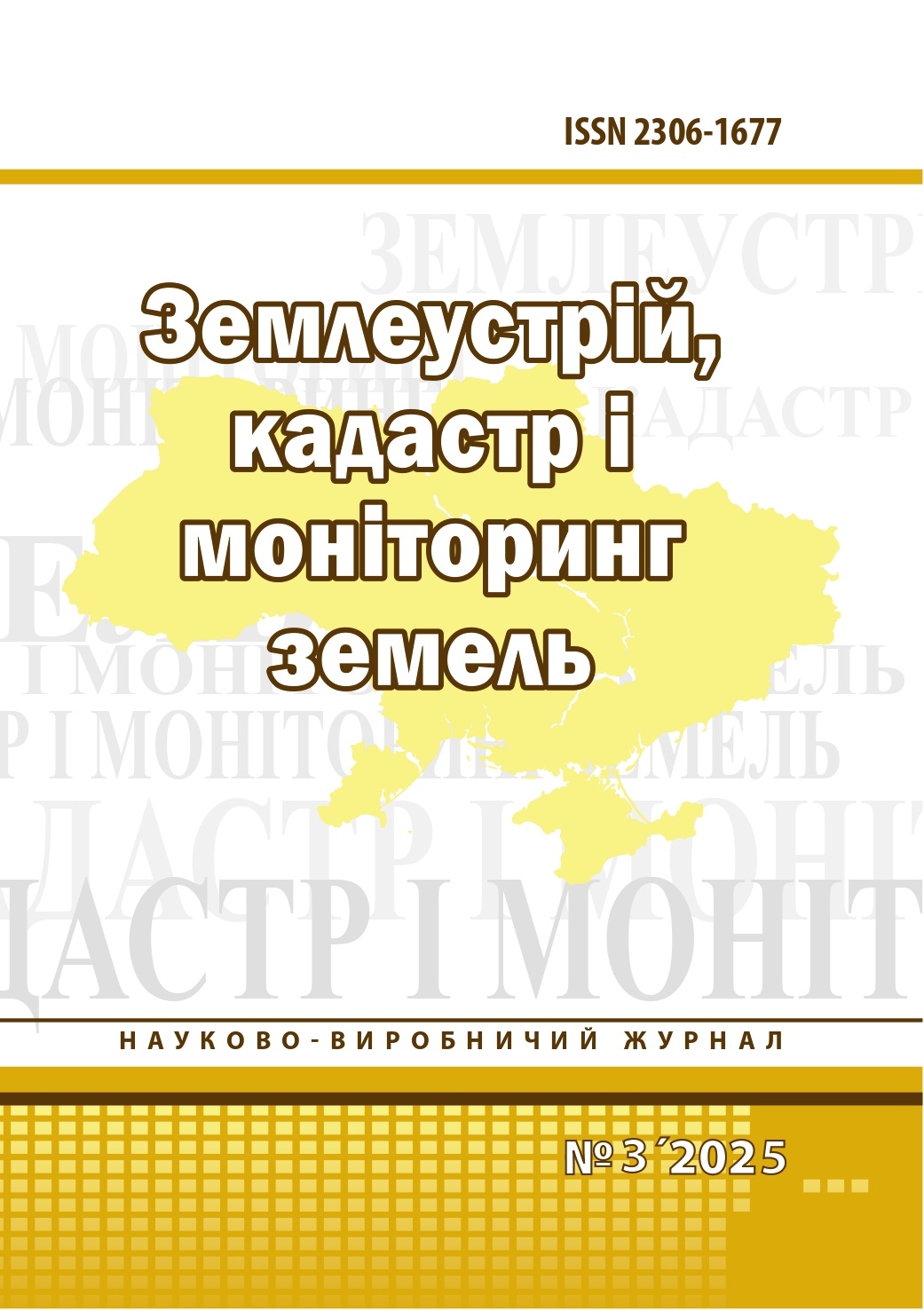Проблеми понятійного апарату економіки природокористування: співвідношення системи та механізму землекористування
DOI:
https://doi.org/10.31548/zemleustriy2017.04.021Анотація
Наведено аналіз співвідношення категорій «система» і «механізм» та їх використання в економіці землекористування. Показано, що еколого-економічний механізм є важливою складовою системи землекористування і основним інструментом реалізації її функцій.
Ключові слова: механізм, система, економіка землекористування, категорії, інструмент, термінологія.
Посилання
Alaev E.B. (1983). Social'no-ehkonomicheskaya geografiya: ponyatijno-terminologicheskij slovar' [Socio-economic geography: terminological dictionary]. Moscow: Mysl', 350.
Bazylevych V.D. ed. (2001). Ekonomichna teorija. Politekonomija [Economic theory. Political economy]. Kiev: Znannja, 296.
Beatty M., Petersen G, Swindale L. (1979). Planning the uses and management of land. Madison: American Society of Agronomy, 1028.
Bobrov V.Ya. (2003). Osnovy rynkovoi' ekonomiky i pidpryjemnyctva [Basics of market economy and entrepreneurship]. Kiev: Vyshcha shkola, 206.
Briggs D., Wyatt B. (1988). Rural land-use change in Europe. In: Whitby M. & Ollershaw J. Land use and the European Environment. London: Belhaven Press, 7-25.
Buravl'ov Je. P. (2004). Bezpeka navkolyshn'ogo seredovyshha [Security of environment]. Kiev: Urozhaj, 320.
Derev'janko O.G. (1998). Finansovo-kredytnyj mehanizm v systemi strategichnogo upravlinnja [Financial-credit mechanism in the system of strategic management] // Finance of Ukraine. 7. 28-34.
Dolіshnіj M.I. ed. (2003). Regional'na polityka ta mehanizm i'i' realizacii'[Regional policy and mechanism of its realization]. Kiev: Naukova knyga, 504.
Frolov I.T., Arab-Ogly E.A., Aref'eva G.S. (1990). Vvedenye v fylosofyju [Introduction to Philosophy]. Moscow: Polytyzdat, Ch.2. 640.
Frolov Yu.T. ed. (1981). Fylosofskyj slovar' [Philosophical dictionary]. Russia, Moscow: Politizdat, 446.
Gal'chyns'kyj A. (2006). Global'ni transformacijni konceptual'ni al'ternatyvy [Global transformational conceptual alternatives]. Kiev: Lybid', 312.
Gorlachuk V.V., V'jun V.G., Sohnych A.Ja. (2001). Zemlekorystuvannja na mezhi tysjacholit' [Land use is on the verge of thousands of years]. L'viv: Ukrai'ns'ki tehnologii', 130.
Kul'ganik O.M. (2008). Teoretychnі zasady formuvannya efektyvnogo mekhanizmu social'no-ehkonomichnogo rozvytku sil's'kyh terytorij [Theoretical principles of formation of an effective mechanism of social and economic development of rural territories] Scientific Bulletin of National Agricultural University, 120. 311-317.
Lavejkin M.I. (2000). Reformuvannja systemy zemlekorystuvannja v Ukrai'ni. [Reforming the land use system in Ukraine]. Kiev: Council for the Study of the Productive Forces of Ukraine, 376.
Lee J. (1987). Land resources and their use in the European Communities. London: New York, 29-63.
Martyn A.H., Tykhenko R.V. (2006). Henezys zemleustroyu ta yoho ponyatiynoho aparatu: retrospektyvnyy analiz ta suchasne rozuminnya [Genesis of the land and its conceptual apparatus: a retrospective analysis and modern understanding]. Land use planning and cadastre. 1. 16-26.
Mazurok P.P. (2004). Istorija ekonomichnyh vchen' u zapytannjah ta vidpovidjah [History of economic doctrines in questions and answers]. Kiev: Znannja, 187.
Medvedjev V.V., Laktionova T.M. (1998). Zemel'ni resursy Ukrai'ny [Land Resources of Ukraine]. Kharkiv-Kiev:Agrarna nauka, 150.
Mel'nychuk O.S. ed. (1974). Slovnyk inshomovnyh sliv [Dictionary of foreign words]. Kiev: Urozhaj, 432.
Mochernij S.V. ed. (2005). Ekonomichnyj encyklopedychnyj slovnyk [Economic Encyclopedia Dictionary]. Lviv: Svit, T.1. 616.
Molen P.V.D., Silayo E.H., Tuladhar A.M. (2008). Land administration Policies and Systems. Stockholm: FIG Working Week, 6.
Sohnych A.Ja. (2002). Problemy vykorystannja i ohorony zemel' v umovah rynkovoi' ekonomiky [Problems of using and protecting land in a market economy]. Lviv: Ukrai'ns'ki tehnologii', 252.
Tykhenko R.V. (2010). Ekoloho-ekonomichna efektyvnistʹ zemleustroyu v umovakh transformatsiyi zemelʹnykh vidnosyn v Ukrayini [Ecological and economic efficiency of land use planning in conditions of transformation of land relations in Ukraine]. Kiev: Anva-print, 208.
Tykhenko R.V. (2011). Zemleustriy yak holovnyy mekhanizm formuvannya ekoloho-bezpechnykh ahroekosystem u suchasnykh silʹsʹkohospodarsʹkykh zemlekorystuvannyakh [Land use planning as the main mechanism for the formation of ecologically safe agroecosystems in modern agricultural land use]. Innovative economy. 1(20). 10-13.
Zanjatost', bezrabotyca. Sluzhba zanjatosty. Tolkovyj slovar' termynov y ponjatyj. (1996). Moscow: Nyva Rossyy, 422.
Zgurovskyj M.Z., Dobronogov A.V., Pomeranceva T.N. (1997). Yssledovanye socyal'nyh processov na osnove metodologyi' systemnogo analyza [Research of social processes on the basis of the methodology of system analysis]. – Kyev: Znanye, 126.
Завантаження
Опубліковано
Номер
Розділ
Ліцензія
Стосунки між правовласниками і користувачами регулюються на умовах ліцензії Creative Commons Із Зазначенням Авторства – Некомерційна – Поширення На Тих Самих Умовах 4.0 Міжнародна (CC BY-NC-SA 4.0):https://creativecommons.org/licenses/by-nc-sa/4.0/deed.uk
Автори, які публікуються у цьому журналі, погоджуються з наступними умовами:
- Автори залишають за собою право на авторство своєї роботи та передають журналу право першої публікації цієї роботи на умовах ліцензії Creative Commons Attribution License, котра дозволяє іншим особам вільно розповсюджувати опубліковану роботу з обов'язковим посиланням на авторів оригінальної роботи та першу публікацію роботи у цьому журналі.
- Автори мають право укладати самостійні додаткові угоди щодо неексклюзивного розповсюдження роботи у тому вигляді, в якому вона була опублікована цим журналом (наприклад, розміщувати роботу в електронному сховищі установи або публікувати у складі монографії), за умови збереження посилання на першу публікацію роботи у цьому журналі.
- Політика журналу дозволяє і заохочує розміщення авторами в мережі Інтернет (наприклад, у сховищах установ або на особистих веб-сайтах) рукопису роботи, як до подання цього рукопису до редакції, так і під час його редакційного опрацювання, оскільки це сприяє виникненню продуктивної наукової дискусії та позитивно позначається на оперативності та динаміці цитування опублікованої роботи (див.The Effect of Open Access).


